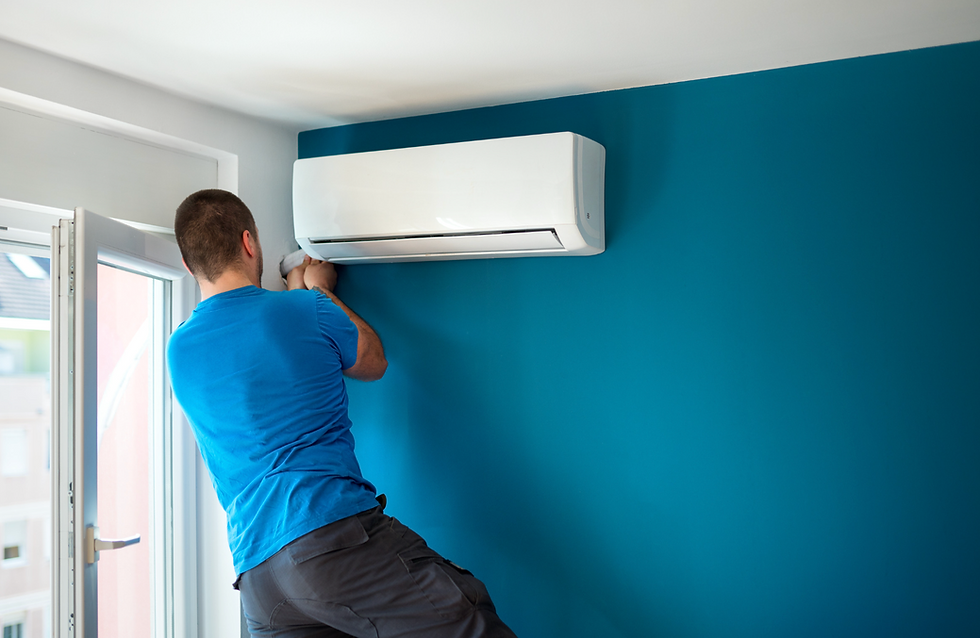5 HVAC Myths That Are Costing You Money
- Rockwall Electric

- May 12, 2025
- 4 min read
Updated: Jan 15

HVAC Myths That Are Costing You Money
When it comes to your HVAC system, misinformation can cost you more than just comfort. Believing common myths can lead to higher energy bills, unnecessary repairs, and even a shortened lifespan for your system.
We're busting five of the most common HVAC myths and showing you how trusting the facts can save you hundreds (if not thousands) over time.
1. "You Only Need to Change Your Filter Once a Year"
Nope. Your HVAC filter is your system's first defense against dust, pet hair, pollen, and other indoor contaminants. A dirty filter reduces airflow and makes your HVAC system work harder, which leads to higher energy bills and increases wear and tear on the motor.
The Truth: Changing your HVAC filter every 1 to 3 months is ideal for most homes. If you have pets, allergies, or live in a particularly dusty environment, you should change it more often.
Why it Matters: A clogged filter reduces system efficiency by up to 15% and forces your system to run longer to maintain the same temperature. Over time, this can lead to burnt-out blower motors, iced-over coils, or even complete system failure. And let's not forget: a clean filter also improves indoor air quality, directly affecting your family's health.
Pro Tip: Set a recurring reminder to check your filter on the first day of every month. If it looks gray and clogged, it's time for a change.
2. "Bigger Is Always Better"
When choosing a new HVAC system, many homeowners assume that a bigger unit means more power and faster cooling. But that's not how it works.
The Truth: HVAC systems need to be sized precisely for the home. An oversized system will short cycle, turning on and off rapidly. This behavior wastes energy, causes uneven heating or cooling, and adds wear and tear on components.
Why it Matters: Short cycling doesn't allow enough time for the air to be dehumidified appropriately, leaving your home feeling clammy and uncomfortable, especially in humid Texas summers. It also leads to increased utility costs and more frequent repairs.
How Sizing Works: Proper sizing considers square footage, ceiling height, insulation quality, number of windows, and even your home's orientation to the sun. At Rockwall Electric Heating and Air, we do a complete Manual J load calculation before recommending any system.
3. "Closing Vents in Unused Rooms Saves Money"
This myth seems logical on the surface: why heat or cool a room no one is using? But the HVAC system doesn't work like your car's air conditioning.
The Truth: Closing vents disrupts the airflow balance in your ductwork. HVAC systems are designed to move a specific volume of air. When you block vents, pressure builds up, leading to duct leaks, reduced efficiency, and even system damage.
Why it Matters: You're not saving money; you're straining your system. This can lead to higher bills, poor air distribution, and added wear on the blower motor.
Better Alternatives:
Invest in zoned HVAC systems if you want control over individual rooms.
Use programmable thermostats to reduce heating/cooling when not home.
Make sure doors to unused rooms are closed to isolate airflow passively.
4. "Thermostat Location Doesn't Matter"
Think of your thermostat as the brain of your HVAC system. Reliable data is needed to make wise decisions.
The Truth: Where your thermostat is installed significantly affects how your HVAC system runs. If it's placed near a heat source (like a window, lamp, or appliance), it will read the space as warmer than it is, triggering your AC unnecessarily.
Why it Matters: Poor placement leads to uneven temperatures throughout the house, frequent cycling, and inflated energy bills. It can also fool you into thinking your system isn't working correctly.
Best Placement Tips:
Central interior wall
Away from direct sunlight or windows
Away from appliances or supply vents
Want to go smart? A smart thermostat with remote sensors can provide a more accurate reading of the home's average temperature, improving comfort and efficiency.
5. "Maintenance Isn't Necessary Unless Something Breaks"
Would you wait for your car engine to seize before changing the oil? Of course not. Your HVAC system is no different.
The Truth: Regular maintenance prevents breakdowns, improves efficiency, and extends the lifespan of your system. It also keeps warranties valid. Many manufacturers require annual maintenance.
Why it Matters:
Catching minor problems early can prevent major repairs.
Clean coils and components run more efficiently, reducing energy use.
Proper maintenance can extend system life by 5+ years.
What to Expect from a Tune-Up:
Inspection of electrical components
Cleaning coils and condensate drains
Checking refrigerant levels
Verifying airflow and thermostat accuracy
Lubricating moving parts
Bonus: A well-maintained system improves indoor air quality and peace of mind.
Don't Let HVAC Myths Burn a Hole in Your Budget
Trust Rockwall Electric Heating and Air to deliver HVAC service grounded in facts, not folklore. We bring over two decades of licensed experience to every job, offering honest advice, long-term safety, and real savings. Whether replacing an old system or just wanting your current one to last longer, our team is here to help.
Do you need a second opinion or want to schedule a tune-up? Contact us today and experience the peace of mind that comes from expert HVAC service tailored to you.
About Rockwall Electric Heating and Air
We're a family-owned company based in Rockwall, Texas, proudly serving homeowners with trustworthy, safety-first electrical and HVAC solutions. Our licensed professionals deliver reliable repairs, transparent pricing, and community-focused care because protecting your family and your home is more than just a job; it's our mission.






Comments